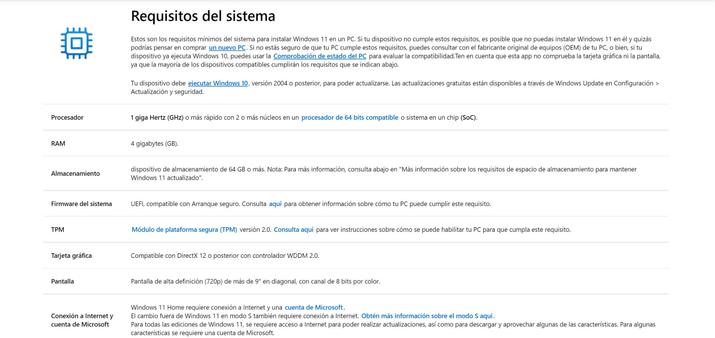Hard drives have been one of the inventions that have made computing evolve the most, and they have been with us for several decades. It is true that these are still used and are still being marketed, but little by little SSDs (or solid state drives) are gaining ground. These offer much higher performance than traditional hard drives, and that is why it seems that Microsoft would like the latter to disappear from our computers.
When booting Windows, there is no color. SSDs make this operating system start much faster than traditional hard drives, which is why more and more users are betting on them. A report from the Trendfocus firm suggests that Microsoft is pressuring manufacturers to abandon hard drives once and for all in pre-built computers by 2023.
SSDs, mandatory to boot Windows?
This request from Microsoft is a bit surprising considering the minimum requirements that its new operating system has. As you can see in the following image, in terms of storage it is only necessary to have a device with 64 GB or more of space. At this point, nothing indicates that we can not install it on a traditional hard drive, although of course Microsoft could be reserving the change in requirements for next year.

Minimum requirements Windows 11
As we said above, this change makes a lot of sense from a technical point of view. SSDs are perfect for installing Windows on them, since both at startup and in general operation we are going to see a substantial improvement compared to other disks. Today, most new laptops hitting the market come with one of these drives as standard, giving the user a much faster and more satisfying experience.
However, we must bear in mind that more modest equipment that does not have access to this technology, which is of course more expensive, is still being sold. Computers should arrive for Microsoft with a small capacity SSD for the operating system to be installed on it, and a traditional hard drive to store all our large files on it.
Price and capacity, the main problems
The ideal scenario would be for all computers to have an SSD for booting, or even a high-capacity SSD to have both Windows and the rest of the files on our computer on it. However, the problem that users face for this is, as always, in the price, and that is that if we compare the price of an SSD with a traditional hard drive, we will see that with equal capacity, the SSD is much more expensive.
What scenario do we face in the coming years? Most likely, PC manufacturers will be launching devices with SSDs for booting and with a complementary traditional hard drive. The most “gaming” teams will almost certainly carry a higher capacity SSD, since the SSD is also ideal for video games (it reduces loading times). What we do not know is that Microsoft will “retaliate” against manufacturers that do not adopt the SSD as a boot device in their computers.














